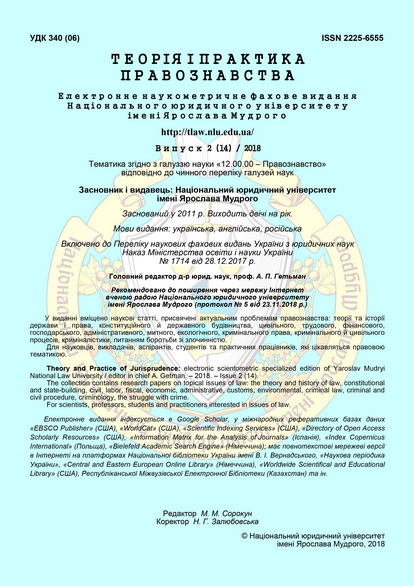The value of the subjective side for the qualification of military crimes
DOI:
https://doi.org/10.21564/2225-6555.2018.14.143446Keywords:
military service, serviceman, subjective side, у fault, motive, purpose.Abstract
The article analyzes the subjective side of military crimes. The science of criminal law under the subjective part of the crime understands its internal (in relation to the objective) side, the mental activity of a person directly related to the commission of a crime and consists of the following features: fault, motive and purpose.
There is a point of view that the subjective side is the least investigated element of the crime and, at the same time, the deepest content. If the objective (external) side reflects the real phenomena occurring in social reality, and can be perceived by the senses, then the subjective side can not be perceived directly, but is only recognized by analyzing the objective features of the crime and the internal mental processes of the sub ' the object of the crime, which causes the corresponding difficulties for the researcher.
The subjective aspect of military crimes has a special peculiarity, which is primarily due to the fact that the disposition of all norms of war crimes is blanket, and therefore have a special, so-called military-criminal unlawfulness. The essence of the special wrongfulness of war crimes means that the act violates not only criminal-law injunctions (prohibitions), forming the content of the criminal law, but simultaneously recognizes the illegal rules of other branches of law, primarily military and administrative law. A serviceman, when committing a crime, at the same time violates the relevant requirements contained in regulations that regulate some aspects of military service and a certain prohibition provided by criminal law.
When considering cases on articles whose disposition has a blanket character (in other words, all war crimes), the courts should ascertain and ascertain in the verdicts as carefully as possible: (а) what exactly the offenses were; (b) the rules of which rules, instructions, and other normative acts are not complied with; (c) Is there a causal link between the violation committed and the socially foreseeable consequences provided by law.
Specificity of innocent harm in the conditions of military service is determined primarily by the features of the object of the attack, the blanket nature of the disposition of war crimes, and in some cases – the non-compliance of the psychophysical qualities of the soldier with the requirements of extreme conditions or neuro-psychological overload.
References
Leont’ev, A.N. (1975). Dejatel’nost’. Soznanie. Lichnost’.Moscow: Politizdat [in Russian].
Kudrjavcev, V.N. (1982). Pravovoe povedenie: norma i patologija.Moscow: Nauka [in Russian].
Shirobokov, A.Ju. (2016). Problema opredelenija subjektivnoj storony prestuplenija. Nauchnye issledovanija i razrabotki molodyh uchenyh. Novosibirsk, 11, 213–217 [in Russian].
Tagancev,N.S.(2001). Russkoe ugolovnoe pravo. Chast’ Obshhaja. (Vols. 1–2; Vol. 1).Tula: Avtograf [in Russian].
Pro praktyku zastosuvannia sudamy Ukrainy zakonodavstva pro deiaki zlochyny proty bezpeky dorozhnoho rukhu ta ekspluatatsii transportu, a takozh pro administratyvni pravoporushennia na transporti: postanova Plenumu Verkhovnogo Sudu Ukrainy vid 23.12.2005 r. № 14. (2006). Visnyk Verkhovnoho Sudu Ukrainy, 1, 6–7.
Dorogin, D.A. (2015). Obstojatel’stva, iskljuchajushhie ugolovnuju otvetstvennost’ v uslovijah voennoj sluzhby.Moscow: Jurlitinform [in Russian].
Pavlenkov, P.V. (2017). Ugolovnoe ulozhenie (Ugolovnyj kodeks) Federativnoj Respubliki Germanija. 2nd ed.Moscow: Prospekt [in Russian].
Platonov, K.K. (1982). Sistema psihologii i teorija otrazhenija.Moscow: Nauka [in Russian].
Kudrjavcev, V.N. (2016). Bor’ba motivov v prestupnom povedenii.Moscow: Norma [in Russian].
Kriminal’naja motivacija. V.N. Kudrjavcev (Ed.). (1986).Moscow: Nauka
Habirov, S.S. (2002). Subjektivnaja storona prestuplenij protiv voennoj sluzhby. Candidate’s thesis.Moscow [in Russian].
Hryshchuk, V.K. (2006). Kryminalne pravo Ukrainy. Zahalna chastyna. Kyiv: InIure [in Ukrainian].
Sitkovskaja, O.D, Konyshev, L.P., Kochenov, M.M. (2000). Novye napravlenija sudebno-psihologicheskoj jekspertizy.Moscow: Jurlitinform [in Russian].
Cherepennikov, R.V. (2001). Celi prestupnogo dejanija i ih ugolovno-pravovoe znachenie. Candidate’s thesis.Moscow [in Russian].
Veresha, R.V. (2017). Teoretyko-prykladni aspekty sub’iektyvnoi storony skladu zlochynu. Kyiv: Alerta [in Ukrainian].
Downloads
Published
How to Cite
Issue
Section
License
Copyright (c) 2018 Theory and practice of jurisprudence

This work is licensed under a Creative Commons Attribution 4.0 International License.




